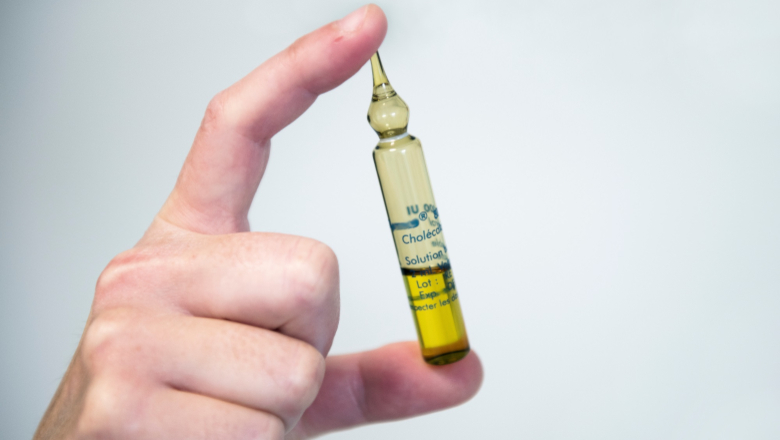According to the conclusions of a study led by the CHU of Angers which were published on Tuesday May 31 in the scientific journal Plos Medicinethe administration of a high dose of vitamin D within 72 hours of the diagnosis of Covid-19 can greatly reduce the risk of death in the elderly.
” data-image-caption=”
Vitamin D could limit deaths © C. Jouannet – CHU Angers
” data-medium-file=”https://www.angers.villactu.fr/wp-content/uploads/2022/06/vitamine-D-C.-Jouannet-CHU-Angers-300×169.jpg” data-large-file=”https://www.angers.villactu.fr/wp-content/uploads/2022/06/vitamine-D-C.-Jouannet-CHU-Angers-780×440.jpg” loading=”lazy” class=”size-full wp-image-68593″ alt=”vitamine D” width=”780″ height=”440″ srcset=”https://www.angers.villactu.fr/wp-content/uploads/2022/06/vitamine-D-C.-Jouannet-CHU-Angers.jpg 780w, https://www.angers.villactu.fr/wp-content/uploads/2022/06/vitamine-D-C.-Jouannet-CHU-Angers-300×169.jpg 300w, https://www.angers.villactu.fr/wp-content/uploads/2022/06/vitamine-D-C.-Jouannet-CHU-Angers-340×192.jpg 340w, https://www.angers.villactu.fr/wp-content/uploads/2022/06/vitamine-D-C.-Jouannet-CHU-Angers-565×319.jpg 565w” sizes=”(max-width: 780px) 100vw, 780px”/>
Vitamin D could limit deaths © C. Jouannet – CHU Angers
–
From April to December 2020, the Angers University Hospital piloted a study called COVIT-TRIAL, labeled a national research priority by the State. His findings have just been published in the scientific journal “ Plos Medicine »What Tuesday, May 31, 2022.
In total, nine French hospitals and their nursing homes took part in this study initiated by Professor Cédric Annweiler, head of the geriatrics department of the CHU d’Angers.
What is Vitamin D?
Vitamin D, a natural hormone, is known for its effects on calcium metabolism and fracture risk, but also for its anti-inflammatory properties in infectious and cancerous diseases. For example, it helps prevent winter respiratory infections, which had been observed long before the Covid-19 era.
How was the study?
The study began in April 2020, during the first wave of Covid-19. This trial, presented as “multicenter, randomized, controlled, intention-to-treat”, had as main objectives to examine the effect on mortality at 14 days of high-dose vitamin D supplementation compared to a standard dose in elderly patients with COVID-19 and at risk of severe progression, but also to clarify the tolerance and safety of high-dose vitamin D supplementation compared to standard-dose vitamin D supplementation.
A total of 260 patients were included in this study, which lasted nine months in nine participating French centers (the university hospitals of Angers, Bordeaux, Limoges, Nantes, Nice, Saint-Etienne, Tours, and the hospitals of Le Mans and Saumur ) and in the EHPAD dependent on these establishments. Patients were aged 65 and over with Covid-19 with unfavorable outcome criteria, or patients aged 75 and over with Covid-19 with no other risk factors.
They were randomly divided into two groups. A first called “intervention” received a single dose of 400,000 IU of vitamin D (high dose vitamin D) within 72 hours of their diagnosis of Covid-19. The group called “control” received a single dose of 50,000 IU within 72 hours of their diagnosis of Covid-19.
« Investigators and patients knew which treatment was being administered. In parallel with the study, all the patients of course continued to receive, in both groups, the best known care for Covid-19 (corticosteroids, oxygen, etc.) “, specifies the CHU of Angers.
The effectiveness of vitamin D demonstrated from the 6th day
The mortality rate fell by 60% in people who received a high dose of vitamin D from the onset of the disease. ” This result is important and consistent with what we knew of the anti-inflammatory effects of vitamin D, by very significantly reducing the risk of death at 14 days, and by clearly avoiding the inflammatory runaway and the cytokine storm observed in the forms severe Covid-19 », Observes Pr Cédric Annweiler.
« This superior efficacy of the high dose of vitamin D effectively persists on mortality, all causes occurring, within 14 days (primary endpoint) without causing more adverse effects than the standard dose. It should be noted that secondary analyzes show a reduction in efficacy at 28 days, which could be expected given the lifespan of vitamin D taken in a single dose at the very beginning of the disease course. The effectiveness of continued maintenance therapy (daily or weekly vitamin D supplementation) following the first intake will be further investigated. “, specify the authors of the COVIT-TRIAL study.
For Professor Cédric Annweiler, head of the geriatrics department at the CHU d’Angers, ” it is important that elderly patients with Covid-19 have normal vitamin D levels through supplementation. It is an additional tool among all the treatments and vaccines we have at our disposal. »
Interest for younger patients?
If few young people have severe forms of Covid-19, would vitamin D supplementation be of interest for people under the age of 65? ” During the period when the study was conducted, we focused on the most fragile population. The interest is to correct vitamin D deficiency. However, it affects young people less. Tomorrow, supplementation in the youngest could be tested on people who also have a vitamin D deficiency », Explains Pré Cédric Annweiler.
–


